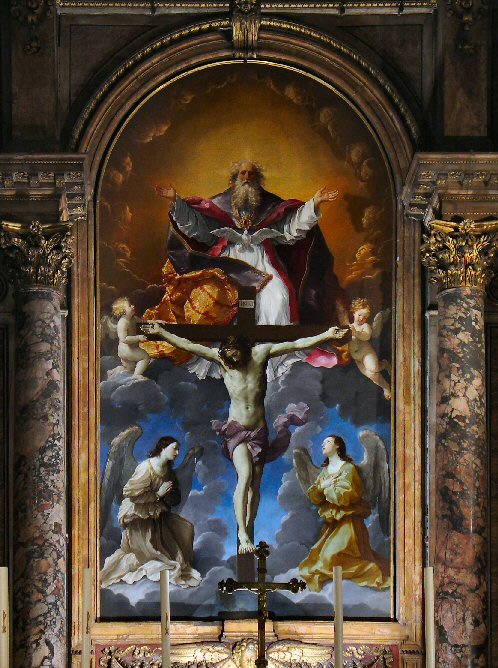FSSP Church in Rome
''That in the Trinity there is no diversity or singleness or solitude, but unity and Trinity, and distinction and identity''
The Sentences of Peter Lombard,Book One, Distinction XXIII, Chapter 5.
As previously stated the proper object of the human intellect is the essences of material creatures. This must be humbly borne in mind as we attempt to climb to a knowledge of the divine essence. This is most particularly so when we are discoursing about the intimate life of the Blessed Trinity. Unless this were revealed to us, man could never have reached a sure knowledge of this, other than by the flights of fancy of certain creative poets and vain philosophers. As St Paul teaches in Romans and as upheld by the First Vatican Council, man comes to an objective knowledge of God by the ladder of created things, in which he apprehends the divine traces in the universe brought into being ex nihilo. As all things outside of God pertain to divine operation ad extra, it ''proceeds'' (in the order of freely willed creation) from the divine power which is common to all Three Persons. Therefore man in contemplating the world is only able to grasp the one God as the efficient and final cause of all. In addition, our notions of God are utterly incapable of circumscribing the infinite perfection of the Godhead but as our Faith is of an objective character and our intellects have been given to us for profit, let us not indulge in mediocre complacency. The concepts of ''person'', ''hypostasis'', ''essence'', ''nature'' and ''subsistence'' are grounded in the reality of our God, One and Three, however as we can only attain to an analogical grasp of the divine being we are constrained to recognise that the Lord as He is in Himself is vastly superior to our notions of Him. But let no Catholic contend that these nouns are misleading as they have been sanctified by the Tradition of the Church and utilised in the General Councils.
The oneness and the threeness in God are irreducible realities that must never be abandoned. The vocabulary developed in the 4th and 5th centuries presented Catholic truth that far surpassed the various heretical options expressed in those days. By asserting the oneness (or consubstantiality) of the Persons, the doctrine of Arius is done away with. By proclaiming the threeness, Sabellianism is countered. Neither ''aspect'' of the divinity can be prioritised as through the other were merely a human imposition on It in order to communicate some mystery more effectively to man. The Blessed Trinity would have remained so even if no other being had been brought into existence. The Trinity would have existed if man had only come to know his creator as one.
He hold God to be sufficient in Himself, containing all absolute perfections in the higher reality of the Godhead. Yet, it is impermissible for us to consider the Divine Persons as somehow contained in this higher perfection. Each Person is not the Other Person but is what They are. This is what we allege when we speak of the irreducible nature of the oneness and threeness. There is nothing accidental in God.
Furthermore as Cajetan teaches, the divine reason is neither absolutely incommunicable nor absolutely communicable. No Person can exist without the Other as a real mutual relation exists between Them which can never be diminished nor altered. The notional acts form the Divine Persons Who are subsisting realities and more than simple relations. We hold to a virtual minor distinction between the Person and the essence so that there is no confusion between the Hypostaseis. In God, there is the most pure communion (circumincessio) between the Three, without division, separation or mixing. The Son is begotten of the Father (''neither necessarily nor freely'') without ever departing from the bosom of the First Person. The Holy Ghost proceeds from Both, from the one spirating principle without transgressing the divine essence. The Father does not exist alone as He is the eternal Father. The Son could not exist in solitude as He is the eternal Son of the Father. The Holy Ghost proceeds from the love of the First and Second Persons and ''seals'' Their perfect society. Solitude is therefore excluded from this communion of love.
Neither can diversity be used as correct terminology to describe the threeness of the One God. Each Person fully possesses by right the Divine Essence which can never be lost. On earth, in the mirror of faith, the Father is only implicitly included in our understanding of the divine being, but when we see face to face, directly and without mediation, He will be completely identified with the Divine essence.
Let us conclude with the wise words of St Hilary:
''The Lord says: Whoever has seen Me, has seen the Father (Jn 14:9). With these words, an understanding of singleness and aloneness is excluded. Indeed, the passage signifies that God is not solitary, and yet the statement teaches that His nature is undifferentiated. Indeed, the Father is seen in the Son by a united likeness of nature. For the begotten and the begetter are one; they are one, but one person. And so the Son is neither solitary nor single nor different''.

No comments:
Post a Comment